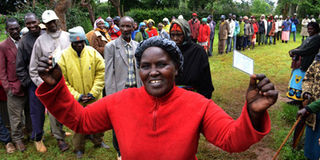High voter turnout gave Jubilee victory

PHOTO | FILE A voter after registering at the Ruring’u Stadium in Nyeri in December in 2012. Jubilee mobilised its supporters to vote in large numbers.
What you need to know:
- Uhuru got over half a million votes in Raila’s strongholds in top job race
President-elect Uhuru Kenyatta’s team believes it won the election because it was more united and ran a far superior campaign than Cord’s.
A tightly-knit and motivated team, rallying home support and building strong alliances with influential leaders were key to victory, the team said.
They were also not shy about promises contained in their manifesto, like the provision of solar-powered laptops to school children as well as free maternity health services.
Both Mr Kenyatta and his running-mate, now Deputy President-Elect William Ruto, persuaded their supporters to register in large numbers and motivated them to turn out and vote. In places such as Gatundu, there were queues that were kilometres long on the election day.
In the end, Mr Kenyatta got 6,173,433 votes countrywide against Prime Minister Raila Odinga’s 5,340,546.
Mr Onyango Oloo, the secretary-general of The National Alliance Party said: “Jubilee was fortunate to have two leaders who were in tandem with where they wanted to go and do. They would sit down and listen to the young technocrats and managers on innovative campaign ways. The spirit of teamwork was oozing all through the team. The presidential candidate and the deputy were also willing to accept innovations.”
Mr Kenyatta is no stranger to Kenyan politics. He was running for the top seat a second time, having lost to President Mwai Kibaki in 2002.
His family name and fortune were an advantage. However, he also faced major hurdles.
First, he was from Central Province and was in a race to succeed an incumbent from the same region.
He also faces war crimes charges at the International Criminal Court and Western countries had warned voters against electing him, threatening them with “consequences” if he won.
In an attempt to explain how Mr Kenyatta surmounted the odds to win the hotly contested election in the first round, a recent post-election analysis by research firm Ipsos Synovate revealed that it all boiled down to voter turnout.
The firm’s lead researcher, Mr Tom Wolf, said that in the 20 counties where Mr Kenyatta won most votes, the average voter turnout was 88 per cent, while in the same number of counties where Mr Odinga won, the turnout was 84 per cent.
“Aside from any irregularities…last minute swings in voting intentions, including the disappearance of the undecided lot, the decline in support for any or all of the six minor candidates and voter turnout made the difference,” Mr Wolf said two weeks ago.
In the 18 counties considered Cord strongholds, Mr Kenyatta got 505,309 votes against the PM’s 3,611,998. To achieve this Jubilee invested heavily in a flamboyant campaign that won over many.
Its two leaders would arrive at campaign meetings in style. In Eldoret for instance, they, together with their entourage used six helicopters, all branded in their respective party colours.
Before rallies, supporters would be issued with branded T-shirts, caps, miniature flags and other campaign clothing. Boda Boda operators got reflective jackets.
Said Mr Oloo: “Jubilee realised that times had changed and they kept abreast with those changes. That is how they managed to bring so many people to their side even at demanding times. We also had the guidance from the experienced politicians.”
Established musicians also performed at Jubilee rallies that were MC-eed by Big Ted, a move that resonated well with the youth.
Mr Kenyatta also learnt a lesson from the last-minute crafting of President Kibaki’s PNU in 2007 and did not want to take any chances with his own State House bid. That, perhaps, explains why he did not take over one of the numerous political parties after ditching Kanu.




